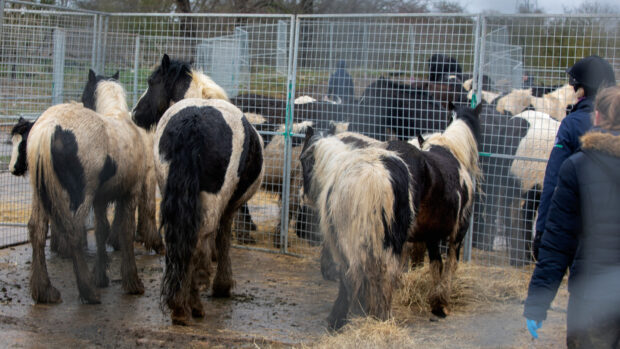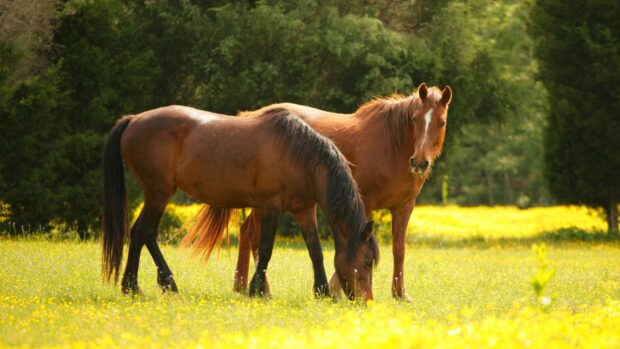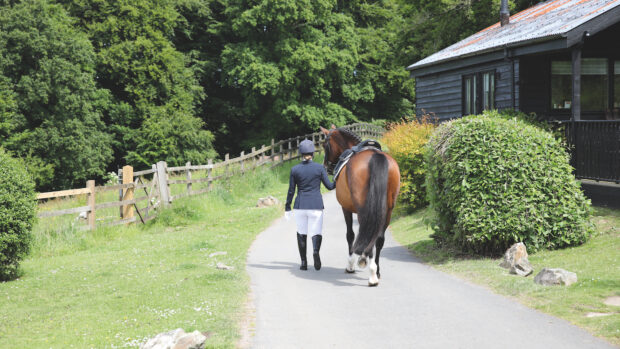In Cairo, not far from one of the ancient wonders of the world is a street that Tegan Joke Van der Post and her team call The Gates of Hell.
Here horses stand tied and tacked up all day, Joke says, in case someone wants to ride. Most are emaciated, many have saddle sores the like of which most people have never seen. Others are made to work with broken legs, dumped by the roadside or out in the desert with catastrophic injuries, left to die.
“You need to see what happens here,” Joke told H&H. “It’s horrific, it’s constant, it’s everywhere. You never forget what you see here; it will haunt you for ever.”
Joke is from the Netherlands and a lifelong horsewoman. She grew up in an animal sanctuary and has been rescuing horses ever since. She spent 10 years living in Majorca, running a horse rescue there.
“I’d always been aware of the situation in Egypt, but never had the chance to do anything about it,” she said. “I didn’t have the time or the money, I had my children; I just couldn’t.”
Joke supported Egyptian charities, “But then Covid hit,” she said. “There were no tourists who could take medicine out there, and the horses were just dying in the streets. I decided that they needed me the most.”
For a while, Joke divided her time between Egypt and Majorca.
“But as time went by, I couldn’t enjoy my life as I couldn’t unsee what I’d seen,” she said. “I couldn’t relax as every minute there would be a horse here breaking its leg and no one helping it. So I decided I needed to do more. I made longer trips, then I was exposed to rabies so couldn’t go home. I realised that if I really wanted to make a difference, I needed to set up a hospital.”
Joke sold everything she had and used her life savings to move to Cairo to set up the Good Karma Sanctuary. The hospital now has three full-time vets and is open for emergencies 24 hours a day.
“Before I came here, I was aware it wasn’t a good place but even being aware and seeing pictures, when it happens right in front of you, it’s shocking,” she said. “I thought it would be like Majorca, with a lot of good horses and then a bad one but here there are thousands of them in dire need. I bought 15 or 16 horses on that first trip as their owners were so horrible; some had broken legs and I bought them so I could put them down.”

Joke said 90% of the horses she sees are there for tourists.
“I don’t understand how tourists can just ride past a bunch of dead horses on their way to the Pyramids,” she said. “It’s not cruelty behind closed doors, it’s everywhere you look. But no one speaks up. They come to the Pyramids and want to take their selfies, and they’re oblivious. If the tourists insisted on healthy horses, this wouldn’t happen. It’s difficult as a foreigner, coming in to tell these people what to do but if it hit them in the wallet – there are a couple of good stables where the horses look magnificent and they make a lot more money; so I hope eventually the others will follow their example.”
Joke said the numbers do not add up; horses can be bought for €200-300, but feeding one adequately costs about €200 per month.
“So if you feed it for about €20 per month and it lasts six to eight months, you then buy another one,” she said. “There’s a lot of ignorance but in the end it comes down to numbers. It’s cheaper to buy a new one than care for the one you have.”
Joke said many of the horses live tied in a nearby street, “living with their saddles and bridles on”, so they are ready for the tourists to ride, “and when the horse dies, they put the tack on the next one”.
“The horses have huge saddle sores,” she said. “Girth sores too, with pus coming out of them, some have broken legs, and broken necks, from the metal chains they’re tied up with.
“There’s a lot of colic from the cheap food they get, they can be worked 20 hours a day. And it doesn’t matter if they’ve got colic or a broken leg; if they can stand, they can work. I see it every day.”
Joke said some progress is being made; police will tell her if they see groups coming back with two people on one horse, so her team can go into the desert to rescue the injured or sick one left behind.
“When you are thankful you can euthanise a horse, you know how bad it is,” she said.
“We call it hell. There’s one street with a long wall where the worst owners tie their horses, which we call the Gates of Hell. This has been life-changing; I couldn’t see it and not do anything.”
Joke’s website is open for donations, but almost more important, she says, is getting the message out there.
“It’s not just money I need, it’s support,” she said. “I need people to speak up; to sign petitions and write to the tourism ministry, to share social media posts, and people to rehome horses. I can’t save them all. My focus is making sure the ones working here are as healthy as they can be.”
Joke said the picture of the horse above is a common sight.
“How bad does the world have to be for that to be normal?” she said. “People ask if I get used to it but for me it gets harder with each horse; another one I’m too late for.”
Charities helping horses in Egypt also include:
You might also be interested in:

Ex-MP highlights plight of Egyptian pyramid horses [PICS/VIDEO]
Ann Widdecombe travelled to Egypt to see the hundreds of horses starving to death as a result of the political
Horse & Hound magazine, out every Thursday, is packed with all the latest news and reports, as well as interviews, specials, nostalgia, vet and training advice. Find how you can enjoy the magazine delivered to your door every week, plus options to upgrade your subscription to access our online service that brings you breaking news and reports as well as other benefits.




